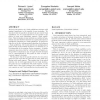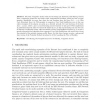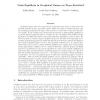234 search results - page 3 / 47 » A polynomial-time nash equilibrium algorithm for repeated ga... |
ATAL
2010
Springer
13 years 6 months ago
2010
Springer
Planning how to interact against bounded memory and unbounded memory learning opponents needs different treatment. Thus far, however, work in this area has shown how to design pla...
SIGECOM
2003
ACM
13 years 10 months ago
2003
ACM
We prove the existence of -Nash equilibrium strategies with support logarithmic in the number of pure strategies. We also show that the payoffs to all players in any (exact) Nash...
WINE
2010
Springer
13 years 3 months ago
2010
Springer
We study Congestion Games with non-increasing cost functions (Cost Sharing Games) from a complexity perspective and resolve their computational hardness, which has been an open que...
SIGECOM
2006
ACM
13 years 11 months ago
2006
ACM
Graphical games have been proposed as a game-theoretic model of large-scale distributed networks of non-cooperative agents. When the number of players is large, and the underlying...
ATAL
2006
Springer
13 years 9 months ago
2006
Springer
Learning to converge to an efficient, i.e., Pareto-optimal Nash equilibrium of the repeated game is an open problem in multiagent learning. Our goal is to facilitate the learning ...



